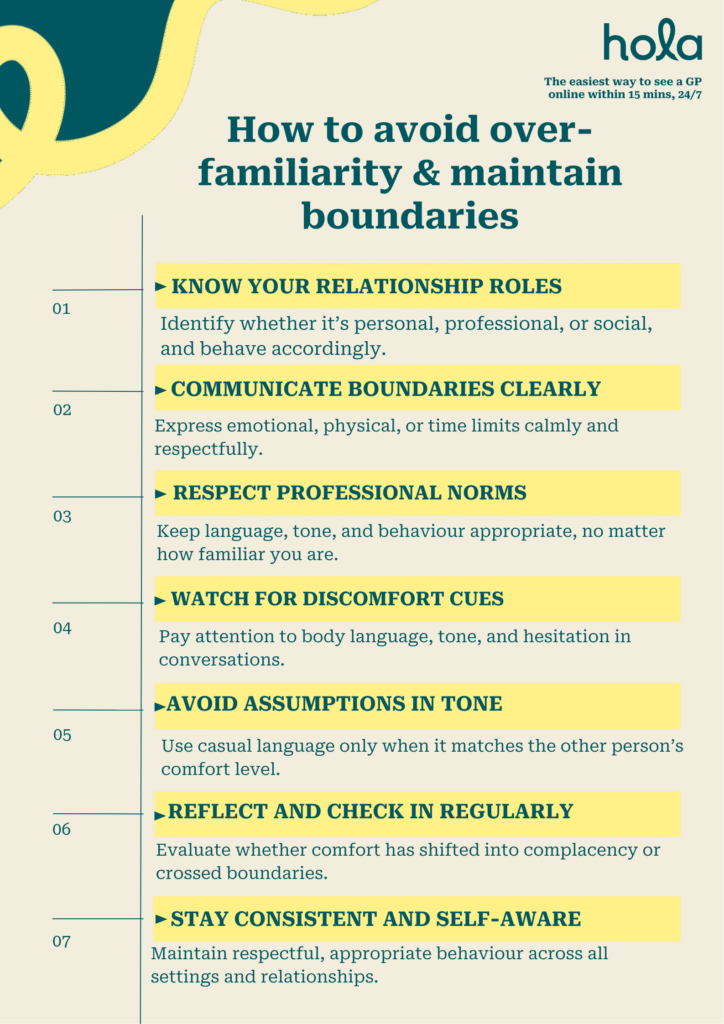Is over-familiarity damaging your relationship?
Written by editorial staff writer at Hola. Medically reviewed by Amira Shah, MA in Counselling Psychology, Registered Psychotherapist.

Contents

Summary: Over-familiarity in relationships can result in partners overlooking each other, diminishing appreciation, and emotional disengagement. While deep comfort and intimacy are valuable, they become harmful when they replace effort, interest, and respect. Keeping a relationship strong means balancing familiarity with warmth, kindness, and mutual growth. Familiarity isn’t the problem—it’s how we remain intentional and attentive over time.
Relationships thrive on connection, confidence, and shared moments. But can too much familiarity—knowing someone inside out, seeing them too often, or becoming too comfortable—start to weaken the connection that once brought two people together? The answer lies in how individuals manage the delicate balance between intimacy and complacency. Over-familiarity, if not addressed, can quietly undermine emotional closeness over time
Introduction to the concept of over-familiarity
Over-familiarity occurs when the natural boundaries in a relationship become vague because of excessive intimacy, informality, and a lack of emotional novelty or curiosity. While closeness in relationships is generally beneficial, over-familiarity can result in diminished respect, ineffective communication, or even conflict, especially when one person starts to take the other for granted. It usually develops gradually and can impact personal, professional, and social interactions. Identifying and addressing over-familiarity is essential for maintaining mutual respect and healthy emotional distance in any relationship.How it can occur in personal, professional, and social relationships
In personal relationships, over-familiarity can appear when partners, friends, or family members grow so accustomed to each other that they cease to express gratitude, become emotionally disengaged, or disregard emotional boundaries.
In workplace environments, it might manifest when colleagues or superiors become excessively casual, leading to ambiguous roles, blurred professional boundaries, or challenges in addressing issues constructively.
In social contexts, over-familiarity might resemble an assumption of excessive closeness too soon, crossing personal boundaries, or making inappropriate jokes or comments under the pretence of being “friendly.
Signs of over-familiarity
Over-familiarity often presents itself as subtle shifts in tone, behaviour, or boundaries that gradually alter the relationship dynamics:- One prominent indicator is a lack of respect, such as dismissive language, frequent interruptions, or disregard for someone’s time and personal space.
- In workplace relationships, it may appear as inappropriate joking, making personal requests that infringe on work boundaries, or treating authority figures as equals without maintaining professional etiquette.
- Within personal relationships, indicators include taking each other for granted, being overly critical, or presuming emotional access without prior discussions. You may also observe a decline in communication effort or emotional sensitivity, which signals fading consideration.
- A common sign of trouble in a relationship is when disagreements are ignored, or one person feels that they can’t voice their discomfort without being called overly sensitive. While these behaviours may seem harmless at first, they can gradually lead to increased tension, resentment, or emotional distance.
Also read: Emotional burnout: Causes, symptoms, and solutions
Ready for positive change? Start your mental health care plan here.
Why over-familiarity can be damaging to relationships
Over-familiarity can quietly undermine the respect, balance, and healthy space that relationships need flourish. When boundaries become indistinct, individuals may take each other for granted or presume access to another’s time, energy, or feelings without consent. This can result in resentment, emotional fatigue, or misunderstandings.- In professional relationships, over-familiarity may lead to a lack of professionalism, favouritism, or obstacles in providing constructive feedback, which can negatively affect team dynamics and workplace culture.
- In personal and social interactions, jokes, comments, or behaviours can sometimes cross boundaries, leading one or both individuals to feel emotionally overwhelmed or undervalued. What was once warmth can begin to feel intrusive or inappropriate.
Also read: What is emotional numbness? How to manage it.
How to avoid over-familiarity and maintain healthy boundaries
Avoiding over-familiarity begins with clear, respectful communication and an awareness of your role in each relationship.
- Acknowledge your relationship roles: Identify whether the relationship is personal, professional, or social, and adjust your behaviour and expectations based on that understanding.
- Communicate openly and respectfully: Don’t assume others know your limits. Express your emotional, physical, or time-related boundaries calmly and clearly. Healthy boundaries support—not hinder—connection.
- Establish and respect personal boundaries: In workplace settings, maintain appropriate language, tone, and behaviour regardless of how long you've known your colleagues. Familiarity should not override professional norms.
- Be attentive to tone and behaviour: Using casual language or humour can feel out of place if the other person doesn’t share the same vibe. Always pay attention to the signs of discomfort or hesitation.
- Frequently check in and reflect: Evaluate the evolution of the relationship and whether comfort has transitioned into complacency or disrespect.
- Maintain consistency and self-awareness: Be consistent in treating individuals across various settings and be mindful of when your behaviour may become overly informal.

How online doctor consultation can help with over-familiarity
Virtual consultations with doctors, particularly those who specialise in mental health, can assist you in recognising and addressing issues related to over-familiarity by providing a safe, non-judgmental environment to delve into your patterns of relationships and boundaries. You can explore your feelings about uncomfortable or overwhelming interactions by discussing them with a therapist or counsellor through video calls or messaging sessions. Together, you can investigate whether being overly familiar with someone might be contributing to these feelings.
These consultations can aid you in spotting early warning signs, comprehending the challenges of setting boundaries, and acquiring tools for more effective communication. A healthcare professional can also help you learn how to maintain a healthy emotional distance in different relationships while preserving the connection. The online format makes support more accessible and adaptable, allowing you to receive assistance at a pace and comfort level that suits you. Whether facing personal or work-related challenges, virtual consultations can offer tailored strategies to foster healthier and more balanced relationships.
Conclusion:
In conclusion, over-familiarity can damage relationships when it leads to neglect or emotional laziness. But when combined with curiosity, respect, and growth, it becomes a strong foundation for enduring love. The key is never letting comfort become carelessness.FAQs
How do I know if I’m being over-familiar with someone?
Here are some signs to know that you are being over-familiar with someone:- You assume things instead of asking
- You speak without filters
- You interrupt or overpower conversations
- You stop making efforts
- You take them for granted
- You become impatient
- You forget boundaries
Why is over-familiarity harmful in relationships?
Over-familiarity is harmful in relationships because it usually leads to the following:- Loss of respect and boundaries
- Taking each other for granted
- Decreased emotional tuning
- Diminished effort and excitement
What are some signs that someone is being over-familiar with me?
Here are some signs to watch out for:- They invade your personal space
- They expect too much out of you
- They treat you casually than they treat others
- They interrupt you often while you speak
- They assume your thoughts or feelings without confirming
- They don’t acknowledge your efforts
Is over-familiarity the same as being too casual?
Over-familiarity means getting so comfortable that you start pushing limits, being less respectful, or acting careless because you assume the relationship can withstand anything.
Being too casual is about the tone or behaviour, speaking or acting informally, but it doesn’t always mean you’re disrespecting.
In short, you can be casual without being over-familiar, but over-familiarity often includes being too casual in a damaging way.
Can over-familiarity cause misunderstandings?
Yes, over-familiarity can cause misunderstandings because individuals might make assumptions about emotions, use unclear or harsh language, ignore boundaries, or fail to express themselves effectively, leading to confusion and emotional pain.Does over-familiarity affect mental health?
Yes, over-familiarity can affect mental health by causing stress, low self-esteem, emotional exhaustion, and a feeling of being overlooked, especially when boundaries aren’t respected.Take control of your mental health. Begin your care plan now.
What we treat
- Cough
- Nausea & vomiting
- Fever
- Hayfever
- Fatigue
- Sore throat
- Acne
- Hair loss
- Gout
- Eczema
- Rosacea
- Sunburn
- UTI
- Erectile dysfunction
- Contraception
- Morning sickness
- Morning after pill
- Prostate health
- Anxiety
- Depression
- Stress
- Grief & loss
- Antidepressants
- Premature ejaculation
- Asthma
- Blood pressure
- Blood thinners
- Diabetes
- Cholesterol
- Migraines & headaches
- Allergies
- Body ache
- Heartburn & reflux
- Sleep disorder
- Pain relief
- Gastro
Related Articles
Disclaimer
This blog is for general informational purposes only and does not indicate that Hola Health provides all treatments or preventive measures mentioned. It is not intended to be a substitute for professional medical advice. Always seek the guidance of your doctor or other qualified health professional with any questions you may have regarding your health or a medical condition. For emergencies please immediately contact 000. Any medical topics discussed are intended to educate, not to imply availability through Hola Health.

Get affordable healthcare on your terms, with quick access to qualified, Australian-registered telehealth doctors & health practitioners, 24/7, 365 days a year. No more searching for ‘doctors near me‘ – Hola connects you instantly.
Address: 79 St Georges Terrace, Perth WA 6000


Hola Health App
Get affordable healthcare on your terms, with quick access to qualified, Australian-registered telehealth doctors & health practitioners, 24/7, 365 days a year. No more searching for ‘doctors near me‘ – Hola connects you instantly.
Call 000 for emergency or urgent medical help.
Address: 79 St Georges Terrace, Perth WA 6000
© Hola Health, a brand of Packapill Pvt Ltd


 Facebook
Facebook  X
X  Copy Link
Copy Link












